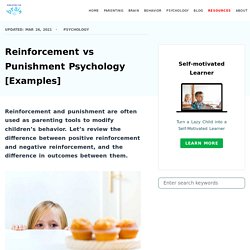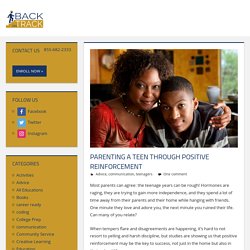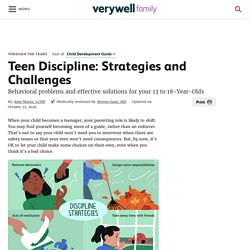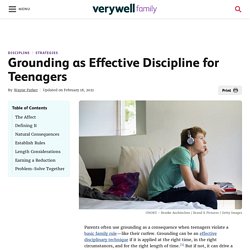

This resource center aims to guide parents on how to use reinforcement and punishment to influence the behaviour of teenage children and better understand the terminology of reinforcement and punishment.
Reinforcement vs Punishment. Reinforcement and punishment are often used as parenting tools to modify children’s behavior.

Let’s review the difference between positive reinforcement and negative reinforcement, and the difference in outcomes between them. The Difference Between Positive And Negative Reinforcement In behavioral psychology, reinforcement is the introduction of a favorable condition that will make the desired behavior more likely to happen, continue or strengthen in the future1. Because the favorable condition acts as a reward, reinforcement is a reward-based operant conditioning. Schedules of Reinforcement. Operant Conditioning- BF Skinner- Positive & Negative Reinforcement / Positive & Negative Punishment. Learning: Negative Reinforcement vs Punishment. Positive and Negative Reinforcement. Positive and Negative Reinforcement. Positive and Negative Reinforcement. Positive and Negative Punishment. Negative Punishment. Positive Punishment. Understanding How Adolescents Think: Guiding Them to Develop Their Own Solutions.
Adolescent Cognitive Development. Adolescent Cognitive Development Adolescence is a time of change.

Some changes are hard to miss, like when you turn around and notice that your child seems to have grown a head taller. What is Considered Normal Teenage Behavior? A decade or more ago, you made it through the “terrible twos” with your child.

Now that he or she is a teenager, you might feel as though you’re playing a whole other ballgame. Your adolescent is transitioning from a child into an adult, and they might exhibit some behaviors that are puzzling or concerning to you. How can you tell whether a behavior is normal teenage behavior or something more? Here are some normal teenage behaviors that you should be ready for, as well as tips on determining whether something requires a professional evaluation.
Do you remember when your child was three years old, and they went from elated over being able to have chocolate milk to furious because you served it in a green cup? Teenage Brains: Wired to Learn. Parenting A Teen Through Positive Reinforcement - Back On Track. Most parents can agree: the teenage years can be rough!

Hormones are raging, they are trying to gain more independence, and they spend a lot of time away from their parents and their home while hanging with friends. One minute they love and adore you, the next minute you ruined their life. Can many of you relate? When tempers flare and disagreements are happening, it’s hard to not resort to yelling and harsh discipline, but studies are showing us that positive reinforcement may be the key to success, not just in the home but also in their school life.
We’ve all heard the saying, “The one who is hardest to love needs love the most.” How to Reward Your Teen for Good Behavior. Teenagers are young adults who are trying to learn the ways of the world.

When they do something great at school or at home or simply make a healthy decision, parents can give them a reward. The reward does not have to be money, but it is a nice way to say "thank you" or "I'm proud of you. " Teens need this positive reinforcement because it shows them that they are on the right track.1 It is also a good life lesson that you can pass on: good things happen to good people. BYU Study: a need for positive reinforcement among teens.
There are countless publications describing the best ways to raise a child in the hopes of them becoming successful adults.

Between the books, magazines and video tutorials, parents may be finding themselves overwhelmed on more than one occasion. But a group of researchers at Brigham Young University have found the answer to helping children through life may be less complicated than it seems. The BYU study found bad behavior can be discouraged among children by simply encouraging good behavior. The study, Flourishing During the Teen Years: Why “Not Being Bad” Isn’t Good Enough, used information from a 10-year project that followed 500 families in order to see where the individuals struggled and what actions helped them become successful. When the study began, the children in the families were 11 years old.
Positive Reinforcement for Teen Issues - Empowered Teens And Parents. Looking at the Good: Are You Providing Your Teen with Enough Positive Reinforcement?

How to Reward Good Behavior and Calm Teen Issues 1. Look at Effort, Not Results You want to encourage your child to make an effort while also teaching that life isn’t fair. This is why it’s important to praise effort, not results. Discipline for Teens: Strategies and Challenges. When your child becomes a teenager, your parenting role is likely to shift.

You may find yourself becoming more of a guide, rather than an enforcer. That’s not to say your child won’t need you to intervene when there are safety issues or that your teen won’t need consequences. But, by now, it’s OK to let your child make some choices on their own, even when you think it’s a bad choice. Typical Teen Behavior. Discipline Kids Who Ignore Consequences. Does your child ignore every consequence you give him?

James Lehman can help with 10 specific ways to make consequences work—even for the most resistant child. When kids are faced with something unpleasant, they’ll often act like it doesn’t matter to them. When your child says, “I don’t care,” or seems unaffected when you give him a consequence, what he’s really saying is, “You can’t hurt me.” That’s because receiving a consequence makes kids feel powerless. 7 Ways to Make Grounding Your Teen Effective Discipline. Parents often use grounding as a consequence when teenagers violate a basic family rule—like their curfew.

Grounding can be an effective disciplinary technique if it is applied at the right time, in the right circumstances, and for the right length of time.1 But if not, it can drive a wedge between parents and teenagers. Learn how to apply grounding as a consequence. How Grounding Affects Teens. How To Discipline a Teenager That Won't Listen. Getting Brutally Honest With Arrogant Teens. Discipline strategies for teenagers. Teenage discipline: the basics Discipline isn’t about punishment.
It’s about teaching children appropriate ways to behave. For teenagers, discipline is about agreeing on and setting appropriate limits and helping them behave within those limits. When your child was younger, you probably used a range of discipline strategies to teach him the basics of good behaviour. Positive vs Negative Reinforcement: Which Is More Effective? Table of Content: 1. What is Reinforcement? Rebellious Teens: 25 Practical Tips to Parent Them Effectively. What do you do with a rebellious teen? It’s a challenging situation for parents to deal with. Angry answers to innocent questions, slammed doors, refusing to study – these are behaviours you may be all too familiar with. Rebellious teens can turn the home into a war zone. Through my work with 25,000 teens so far, I’ve come across every kind of parent-teen problem you can imagine.
I’ve learned what works and what doesn’t.